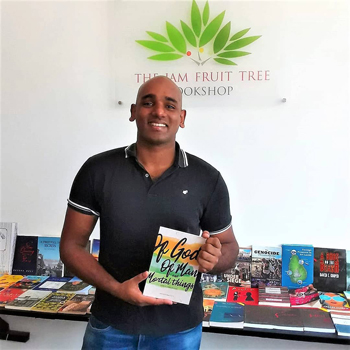An evangelical majesty rings through this debut collection of poetry

Sandesh with his book
Sandesh Bartlett’s mother was a literature teacher, so that before he was 10 he knew words like ‘hyperbole’ and ‘onomatopoeia’. But it was being in the choir stalls of the S. Thomas’ Mt. Lavinia chapel- captivated by the solemn beauty of all the liturgical praise and worship that kindled in him a love for language.
The elevated diction and soaring old hymns with their “rich language, masterfully crafted with a wondrous melodic metre, working in congruence with music”- filled him with awe and glory.
Something of this evangelical majesty is at the heart of Sandesh’s debut collection of poetry ‘Of God, Of Man and Mortal Things’, though few poems in it are actually religious.
In his introduction to the collection, Sandesh sadly notes that “modern poetry often does not reflect the times in which we live, but rather reflect on the self”. Such ‘selfie poems’ often fill their frames with falsely cheerful ‘good vibes only’ or with banshee wails of trite sentiments often as ‘original’ as sliced bread.
The opposite of this is often true of Sandesh’s poetry that looks at the peculiar world in which he lives with irony, sometimes darkness and despair, and sporadically with hope but almost always with stringent craftsmanship, elegance and percipience.
Though in one of his poems he inadvertently lets out that he was at school a “six foot tall/ celebrated sportsman” (an oarsman on the Beira as it turns out) out of this book wafts a different persona – a sensitive poet with both soul and wit- writing in formal verse.
The variety of themes in the collection is enchanting: from the verbal romp of ‘Panthera Pardus Koheda?’ – where our safari obsession with the leopard is lampooned in all its irony as we are also the predator’s chief and only enemy to Colombology which is a snide cocktail laced with the velvety glamour and emptiness of the privileged youthful nightlife of the capital.
In between you find poems steeped in Biblical landscape and imagery, diatribes on the colour bar, politics, ponderings on the lore of Lankan history, COVID-19 and a liberal smattering of beautiful classical images and themes.
Vaidehi Perera in her Foreword comments on Sandesh having managed to achieve “a variety of tones and moods using the (rather difficult rhyming) couplet”. Though the rhyming does get the better of the rhymer- when without metre the end rhymes simply don’t sound right.
You stand awed before the poem Crucifixion (also a visual poem shaped like a cross). Solemn, evangelical, it takes you straight to the Thomian Chapel of the Transfiguration with the soaring rafters and sanctity just like another poem titled Tempus Fugit which with a Latin dictum for refrain captures the spirit of that very Anglican, old public school establishment.
Ironically, Sandesh finds free verse challenging. He is one of those formal craftsmen who need a framework of rhyme and metre and for some reason cannot get in to the more casual, instinctive flow of blank verse.
These poems are all testimony to Sandesh’s debt to what Vaidehi calls “the poetry and grandeur of the psalms and the King James (VI) Bible”.
Looking back to those early days of emulating hymns, Sandesh says that “even the occasional Greek and Latin phrases of the Church spoke volumes to me; it fascinated me how the same ‘panis’ in ‘panis angelicus’ shared the same root word with the heartiest staple of Sri Lankan breakfasts – our Roast ‘paan’.”
His first attempts to versify at middle school would “border on blatant plagiarism and cliché” of the Thomian hymnal. Foraying into other themes like love, Sri Lankan politics and war however “kindled a spark of originality although the flames of what the Chapel of the Transfiguration kindled in me are unlikely to ever be extinguished. I will always have a love for old hymns and their unadulterated power.”
Not surprisingly Keats, Blake, Frost and Poe are favourites for Sandesh. So is Richard de Zoysa whose Animal Crackers has been a beacon for him alongside poems like Keats’s Ode to a Nightingale, Blake’s Songs of Innocence and of Experience, and Emily Dickinson’s ‘Tell All The Truth But Tell It Slant’.
Occasionally humour finds its ‘opening’ in the collection- as in Live Exhibit where what the poet fancies is a proud moment of charming Colombo’s ‘old elite’ at the Lionel Wendt with his erudition is (almost) ruined because his zip is down till his wits unexpectedly save the day.
The book’s visual impact deserves mention. A Jam Fruit tree publication, the jacket of Of God, Of Man and Mortal Things, in shades of avocado and ochre, and overall crisp elegance makes a worthy contender for the best turned out poetry book of the year.
As for the content, they will be a worthy addition to the corpus of Sri Lankan poetry and will surely, to borrow Sandesh’s own words from his Epilogue- “surpass (their) maker’s worth/ And thus, taste permanence”.


